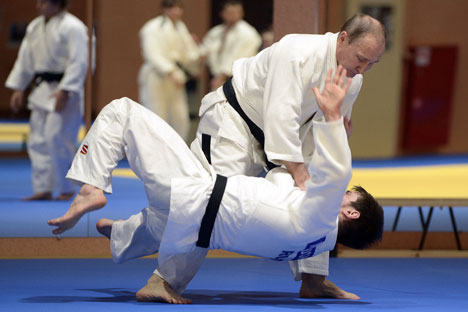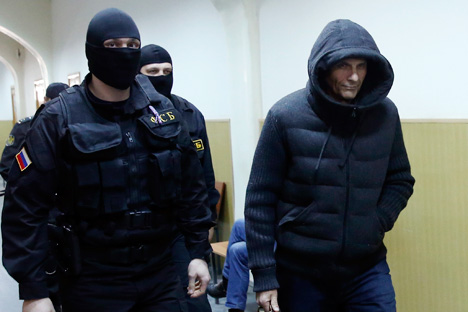Economic crisis rolls corruption back in Russia?

Putin demanded that the members of the council take tough measures to return assets illegally taken out of the country.
Alexey Nikolsky / RIA NovostiAllegations of corruption have swirled around Russian President Vladimir Putin for a while, but a recent 30-minute film called Putin's Secret Riches, aired on a British TV channel, BBC One, on January 25, showed a US official accusing the Russian leader of corruption for the first time.
Adam Szubin, acting under-secretary for terrorism and financial intelligence at the U.S. Treasury, alleged, in comments on the film, that Putin is the richest man in Europe, with a fortune valued at $40 billion. He also alleged that Putin owns a yacht and a palace and everyone knows it.
The “revealing” report, which the Kremlin dismissed as groundless slander, appeared on the eve of a meeting of the Presidential Council for Countering Corruption in Russia, where the enormous damage caused by this misconduct was discussed.
At the meeting, Putin demanded that members of the council take tough measures to return assets illegally taken out of the country.
The country is mired in crisis, but the authorities have only succeeded in getting 588 million ($7.6 million) of the 15.5 billion rubles ($201 million) that corrupt officials were ordered by courts to pay back in 2015. “Let’s agree, this is quite a modest amount,” Putin said.
However, judging by the new Corruption Perceptions Index, published by Transparency International a day after that meeting, Russia has become a less corrupt country over the past year, rising 17 places in the rankings.
Does this mean that Russia has simply become better at counting money that has disappeared from the budget? In part, yes. The stagnating economy changes the situation on the black market, too.
Elite wars
The arrests in 2015 of over a dozen people from the regional political elite, including two incumbent governors, caused quite a stir among the Russian public.
One of them, Sakhalin Governor Alexander Khoroshavin, was sent to Moscow immediately after a search of his property. Following discovery of bundles of cash amounting to tens of millions of rubles at his country house, the disgraced governor was flown in economy class and, according to passengers on the flight, looked quite “lost.”
The case involved the certification of more than $15 million worth of stolen assets, bribes of $5.6 million, more than 60 kilograms (132 pounds) of jewellery found in a safe and 150 watches costing between $30,000 and $1 million each.
Talk about a “purge” at the top grew louder in the wake of Khoroshavin’s ouster. It appeared the government would continue to punish the most wasteful officials, because it had become an unaffordable luxury to turn a blind eye to corruption during a crisis.
However, no major figures have been imprisoned since then and some analysts believe the incident could signal not the beginning of a purge of highly-positioned corrupt officials, but the strengthening of an inter-clan struggle for diminishing resources.
“In fact, the distribution system of money [from the federal government] is simply tightening up, and corruption is being used in the fight with inter-clan groups," said Yuly Nisnevich, the head of the Laboratory for Anti-Corruption Policy at the Higher School of Economics in Moscow.
In the end, the one with a more powerful patron wins. In 2015, federal funds transfers to regional budgets decreased in all regions except Chechnya. Such restraint in cash infusions influences the corruption turnover correspondingly.
“The crisis, by generating an administrative struggle for money, can improve the efficiency of spending," said Anton Pominov, head of the Centre for Anti-Corruption Research at Transparency International–Russia.
Taking more, but being more careful
According to analysts, the crisis has caused mid-level officials to be more cautious. No fundamentally new schemes of corruption have appeared. Additionally, since very few new players enter the market in a crisis, the number of kickbacks to officials also decreased.
Interestingly, at the same time, the average size of bribes in Russia has increased. In 2015, it reached $9,440. During the earlier reporting period, it was $5,600, according to the Association of Russian Lawyers for Human Rights.
“This is due to the dependence of corruption turnover on foreign economic ties,” said Maria Bast, the association's chairperson, speaking to RIR. Bast presented the annual report of the independent anti-corruption organization Clean Hands (‘Chistye ruki’ in Russian) in September 2015.
In areas where really vast sums of are involved, like public procurement and state contracts, officials take bribes in euros or dollars. Since the ruble has been devalued, many have been forced to increase their rates because they do not want to lose income, said Bast.
‘Clean Hands’ estimated the volume of corruption in Russia in September 2015 to be 54 percent of GDP, a record high. Such large numbers make the authorities take corruption, as a phenomenon which eats into the budget, more seriously.
Such numbers make the authorities take corruption – as a phenomenon that eats the budget – more seriously.
At the meeting of the Presidential Council on Countering Corruption in Russia, Sergei Ivanov, the head of the Presidential Administration, ordered the establishment of a mechanism for the recovery of property from officials if a difference between revenues and expenditures is discovered.
But to recover funds for a villa that was illegally acquired, for instance, in Greece, is not an easy task. To do this you need to convince the Greeks to sell it. In other words officials must activate contacts with foreign colleagues, an area where cooperation in Russia “is weak," according to Transparency International.
All rights reserved by Rossiyskaya Gazeta.
Subscribe
to our newsletter!
Get the week's best stories straight to your inbox
